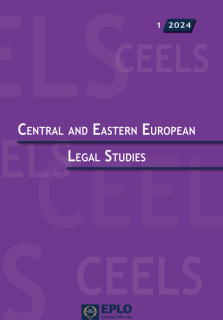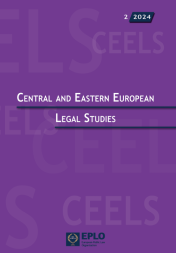
Central and Eastern European Legal Studies 1/2024
In the first issue of the year 2024 of the Central and Eastern European Legal Studies – CEELS 1/2024 the reader can find contributions by academics and jurists from Bosnia and Herzegovina, Lithuania, Slovakia, Türkiye and Ukraine.
The first paper in this issue considers the structure of the Mariupol Greek Court and the changes that have taken place during its operation. The study defines the fundamental spheres of the institution’s activity as well as identifies its areas of responsibility. Although the Mariupol Greek Court has long been recognized as the local self-government body which embodied the autonomous position of the Greeks in the administrative system of Russia, its liquidation was a direct consequence of the public administration system reforms carried out in the ’60s and ’70s of the 19th century along with a significant decrease in the efficiency of administrative functions. Extrapolating the modern terminology to the political and legal realities of the 18th and 19th centuries, the authors identify the Mariupol model of Greek self-government as a certain prototype of national and territorial autonomy.
In the second paper, the author selects and presents seven asylum cases published in the Collection of Decisions of the Supreme Administrative Court of the Slovak Republic: they concern the refusal to join the basic military service, imputed political opinions, a certain social group, information about the country of origin, prospective assessment of the reasonableness of the fear of persecution, assessment of the existence of serious injustice when deciding on the granting of subsidiary protection. The author also points to the impact of the refugee waves on the number of asylum seekers from a statistical perspective and to the refugee wave from Ukraine as a result of Russia’s military aggression.
An original analysis is carried out in the next paper, that is, the analysis of fantasy literature from the point of view of a legal theorist. Not a common but fully legitimate analysis because there is a connection between law, statesmanship, political science, which are classical utopias, and also because fantasy literature is a reflection of the social ideal of a certain segment of the population in a modern society. Social preferences of fandom members and other characteristics such as preference for material modesty, close connection with nature, reject industrialism and money-capitalist relations as well as a distrust of formal institutions and preference for an organization of society based on natural authorities and friendly relations are presented in the paper. With regard to a formalized legal system, fandom members ignore and even condemn it as complex, unfair, too professionalized etc.
The fourth paper reviews significant cases in the practice of the ITLOS in which provisional measures are prescribed: In the period of 1997-2009, in chronological order, the provisional measures are prescribed in “The M/V ‘SAIGA’ (No. 2) Case” (Case No. 2), “New Zealand v. Japan; Australia v. Japan” (“Southern Bluefin Tuna cases”) (Cases Nos. 3 and 4), “Ireland v. the United Kingdom” (“The MOX Plant Case”) (Case No. 10) and “Malaysia v. Singapore” (Case No. 12) cases, all of which might be considered as standard setting decisions with regard to substantial and procedural aspects of provisional measures. The author concludes that the prescription of provisional measures by the ITLOS in 1997-2009, which also gave an opportunity for important literature contribution, has enlightened the path that would be followed in future provisional measures practice.
The fifth paper in this CEELS issue discusses the two main models of financing public functions in Lithuania, depending on the source of financing - budgetary and objective (special). In the first case, the source of financing is the State and municipal budgets, in the second case, the funds of targeted monetary funds and special budget programs. The paper, based on the analysis of existing legal acts, examines the budget execution process, which includes both the collection of budget revenues and the allocation of budget allocations for the payment of managers’ expenses. Special attention in the paper is devoted to special cases of budget implementation, when budget allocations are used to pay for unforeseen expenses, as well as when it is necessary to pay expenses without implementing budget revenue collection plans.
Last but not least, the sixth paper discusses the three most important issues with regard to the position of the Constitutional Court of Bosnia and Herzegovina: 1) the composition of the Court regarding the presence of foreign judges in it; 2) the method of election of judges; and 3) the methods of decision-making. The purpose of this work is to analyze some of these issues in light of new developments regarding the Court. Namely, although composed of nine judges, the Court now functions with only six judges, which can be lowered to five or even four soon, which, if it happens, would have repercussions in the functioning of the Court. Therefore, different factors contributed to the solution of this dangerous situation. The analysis of the Opinion of the Venice Commission, however, shows that its ideas have to be criticised for their essentially political content and the Commission’s political approach to the issue.
Summary
K. Balabanov / A. Hedo, The Mariupol Greek Court: Jurisdiction and Activities [IN ENGLISH] (17 pp.)
E. Berthotyová, Current Challenges in the Jurisprudence of the Supreme Administrative Court of the Slovak Republic in Asylum Cases [IN ENGLISH] (14 pp.)
D. Šmihula, A Legal Theorist’s View of Fantasy Literature [IN ENGLISH] (15 pp.)
M. Semih Gemalmaz, ITLOS Practice of Environmental Protection by the Use of the Provisional Measures Instrument: 1997-2009 [IN ENGLISH] (50 pp.)
B. Sudavičius, Biudžeto vykdymo teisinis reguliavimas Lietuvos Respublikoje [Legal Regulation of Budget Execution in the Republic of Lithuania] [IN LITHUANIAN] (28 pp.)
G. Marković, The Problems of Constitutionalism in Bosnia and Herzegovina – The Case of the Constitutional Court of Bosnia and Herzegovina [IN ENGLISH] (18 pp.)



























